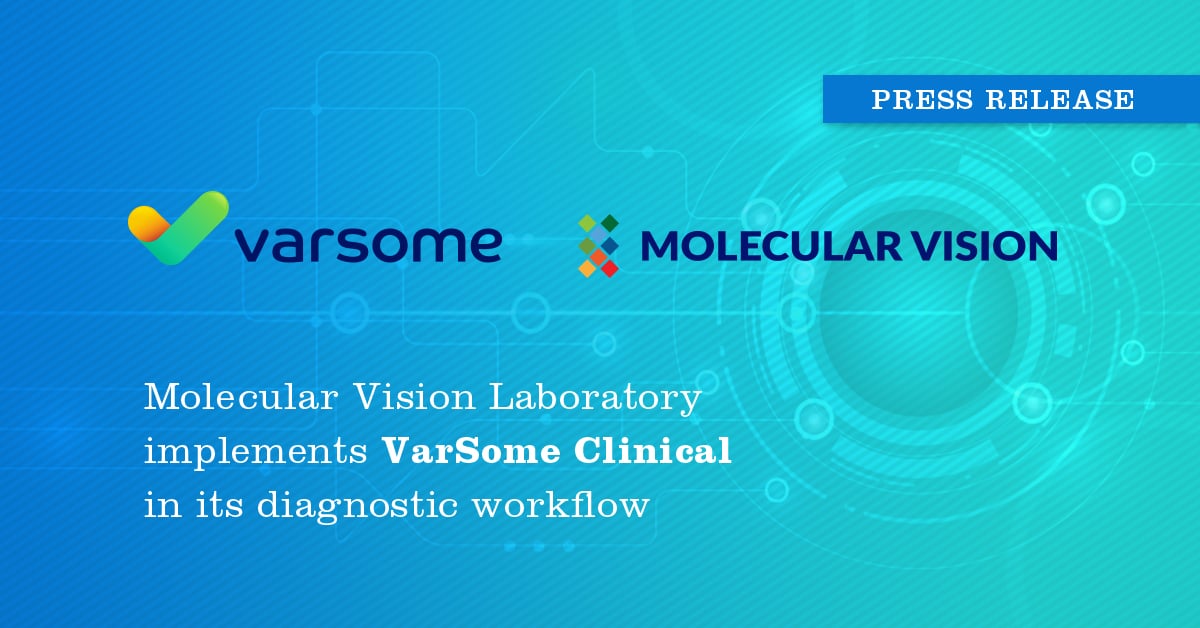
Lausanne, May 21th, 2019. Saphetor SA, a Swiss precision medicine company and the creator of VarSome, a suite of advanced bioinformatics solutions, announced today a partnership with Molecular Vision Laboratory (MVL), a CAP and CLIA-certified medical diagnostic laboratory based in Oregon, USA, providing comprehensive genetic NGS-based testing for inherited retinal dystrophies.
Saphetor’s VarSome Clinical, a clinically-certified web-based platform for fast and accurate variant discovery, annotation, and interpretation of NGS data has become a centerpiece in a routine diagnostic workflow for a number of diagnostic MVL’s in house developed panels. Moreover, VarSome Clinical’s intuitive and feature-rich interface is going to bring additional value to MVL’s offerings, by providing its customers with the ability to interactively browse and filter data primarily analyzed by MVL’s experts.
Dr John Chiang, Director of Molecular Vision Laboratory, said:
‘VarSome Clinical analysis and interpretation tool can be securely accessed from any computer with internet access and shared with our ordering clients who will have full access to analysis results as well as all intermediary data files and interactive interpretation tools provided by VarSome Clinical. We are excited to share this new development and we believe that this additional accessibility and transparency will strengthen collaborations, improve mutation detection rates, and minimize errors.
Dr Andreas Massouras, CEO and Founder of Saphetor SA, commented:
‘We are delighted to count Molecular Vision Laboratory among our clients and committed to supporting MVL on its mission to provide unparalleled service to its customers and to harness the potential of genomics to improve patient care by developing market-leading tests at competitive prices.’
About Molecular Vision Laboratory
Molecular Vision Labolatory (MVL) is a CAP and CLIA-certified medical diagnostic laboratory that provides state-of-the-art genetic testing for clients worldwide. Its roots stem from the Casey Eye Institute, at the Oregon Health and Science University (OHSU), where the Director Dr. John Chiang and the team of lab technicians and bioinformatics scientists developed the most comprehensive test panel for inherited retinal dystrophies. MVL is now majority owned and supported by Centrillion Biosciences, a biotechnology company based in Palo Alto, California. MVL’s close relationship with Centrillion’s team of highly experienced genomics technology developers allows MVL to bring the best and most affordable tests to its clients.
MVL Vision Panel is a comprehensive test of vision-related inherited conditions covering retinal dystrophy, developmental eye diseases, and pigmentation conditions, including newly identified genes such as CLUAP1 (a new LCA gene) and REEP6 (a new RP gene). Our MVL Vision Panel (v2) consists of 581 genes with an average coverage of ~700 reads and at least 30X coverage in >96% of the panel. Targeted regions cover all exons, exon-intron boundaries, and relevant, deep-intronic regions.
About Saphetor SA
Saphetor SA, is a Swiss precision-medicine company dedicated to large-scale identification and interpretation of human genetic variants by leveraging proprietary algorithms and expert domain knowledge. Saphetor is the creator of VarSome, a suite of intuitive and data-driven bioinformatics solutions both for clinicians and researchers. VarSome.com search engine and professional community is freely accessible, featuring a widely-recognized community-driven knowledge base that enables flexible queries across more than 30 genetic and genomic data resources. VarSome Pro and VarSome Clinical are professional editions of VarSome with powerful functionality and further sophisticated data-mining and analysis tools. While VarSome Pro serves researchers, VarSome Clinical is a clinically-accredited platform allowing fast and accurate variant discovery, annotation, and interpretation of NGS data for whole genomes, exomes, and gene panels, which helps clinicians reach faster and more accurate diagnoses and treatment decisions for genetic conditions.


